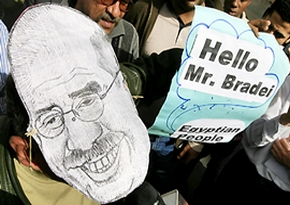 HAVING been at the centre of a massive controversy in Egypt over recent months, former United Nations nuclear chief Mohamed El-Baradei is contemplating his future after arriving back in Cairo on Friday to an exuberant welcome from supporters.
HAVING been at the centre of a massive controversy in Egypt over recent months, former United Nations nuclear chief Mohamed El-Baradei is contemplating his future after arriving back in Cairo on Friday to an exuberant welcome from supporters. An ambitious man: A screen shot showing the Facebook page of the group supporting former UN nuclear chief Mohamed El-Baradei for Egypt’s presidency in the 2011 election.
While opposition activists have encouraged him to go ahead with his declared agenda to introduce wider democratic reforms, others in this nation of 80 million population have advised him to keep a low profile.
More than 1,000 well-wishers gathered at Cairo Airport on Friday calling for him to run in presidential elections due next year.
They waved flags and held up posters saying "Yes: El-Baradei President of Egypt" and sang the national anthem. "I am here because I want the bad situation in Egyptian society to change," commented one woman, Leila. "I say to El-Baradei: 'we need you, we support you'."
Late last year, El-Baradei, 67, said he considered running for presidency in next year’s elections. As head of the International Atomic Energy Agency for 12 years, El-Baradei built an international reputation handling negotiations with Iran over its controversial nuclear programme. In 2005, he won the Nobel Peace Prize.
Since leaving the Vienna-based UN agency last November, he has called for political reforms in Egypt’s where President Hosni Mubarak has been in power for nearly 30 year.
"El-Baradei has made a difficult choice to come back to his country," observed the best-selling Egyptian author, Alaa el-Aswany, who joined the crowds at the airport.
"He could have had a beautiful retirement, but instead he came back to support his people to get a real democracy. He is very prepared for the consequences of this because it does not come for free."
While Egypt's independent newspapers saturday gave prominence coverage to El-Baradei’s homecoming, the semi-official media gave a short shrift to the news.
Ahmed Maher, who leads the youth political activist 6 April Movement and was temporarily detained on his way to the airport, says he has faith in El-Baradei.
"If he nominates himself, we will back him and promote him. He should be the alternative to the existing regime. He is held in high international esteem and has great administrative experience. He is a very appropriate person," he told the BBC.
In an interview with Egypt's private Dream TV broadcast on Thursday, the long-time diplomat, repeated that he would enter political life on condition that there were free elections.
He called for a constitutional amendment that would enable him and others to become candidates.
Current constitutional rules effectively bar him from standing in a presidential race. Contenders must have been a leading member of a political party represented in Parliament for at least a year.
To stand as an independent candidate, he would need at least 250 signatures from officials in elected bodies that are dominated by the ruling National Democratic Party. State media have already criticised El-Baradei for his comments on Egyptian politics. He has been accused of knowing little about his country after decades working abroad for the UN.
Some reform campaigners have also raised questions about his suitability to run for office.
"He doesn't have a past in activism or politics in Egypt," notes wellknown blogger, Wael Abbas.
"He's not Lenin coming back to Russia after the Revolution or Mandela coming out of prison. So I don't think the support for him is well grounded,” he told the BBC.
“I advise El-Baradei not to be duped by the campaigns, which try to exploit him,” wrote Mohamed Fouda in the semi-official newspaper Al- Messa on Saturday.



